Echo Spot vs Echo Dot: Which Amazon smart speaker wins?
I tested two of the best Alexa smart speakers under $100 head-to-head comparing price, features, and more.
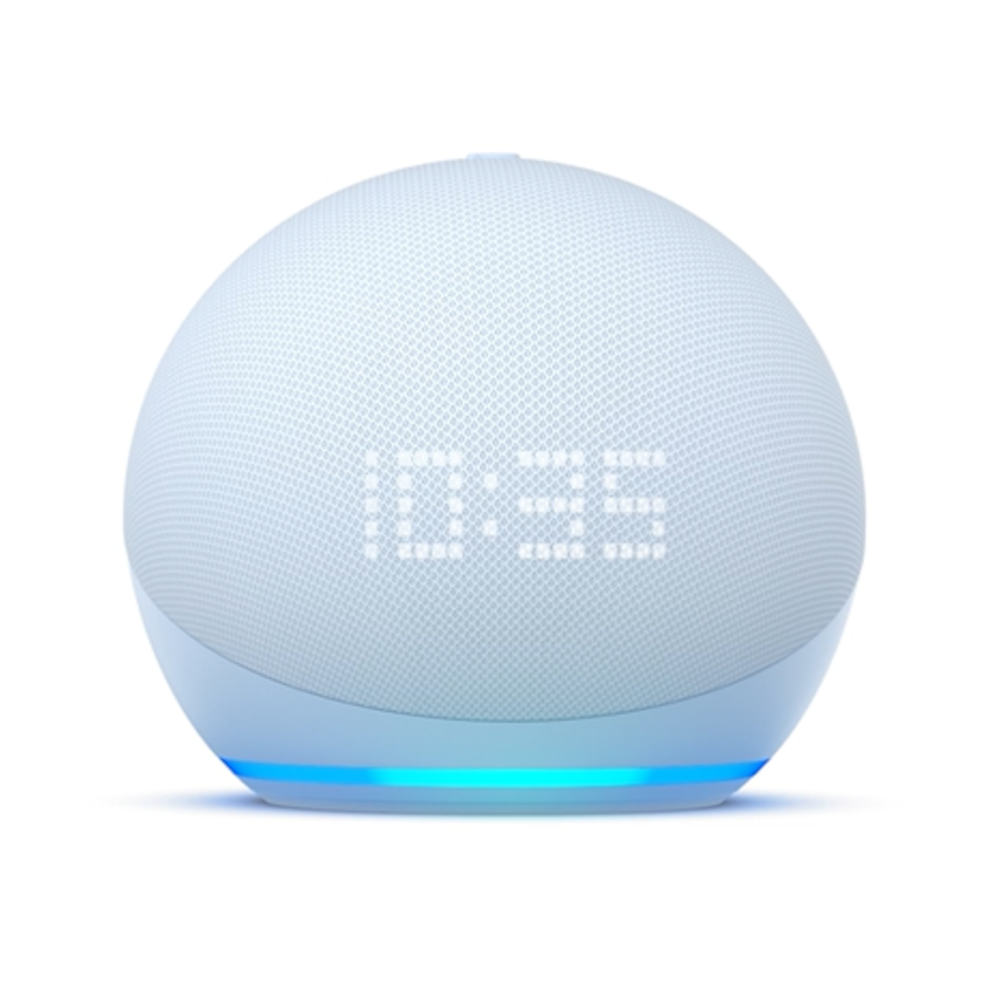
Control your smart home, get information, and make calls using just your voice with the best-sounding version of the Echo Dot yet. An LED lighting system displays text such as the time or song titles. Meanwhile, built-in temperature sensors add even more layers of home automation functionality to the little smart speaker.
For
- Upgraded display functionality
- Better sound performance
- Eero built-in
- Room temperature sensor
Against
- No more 3.5mm line out
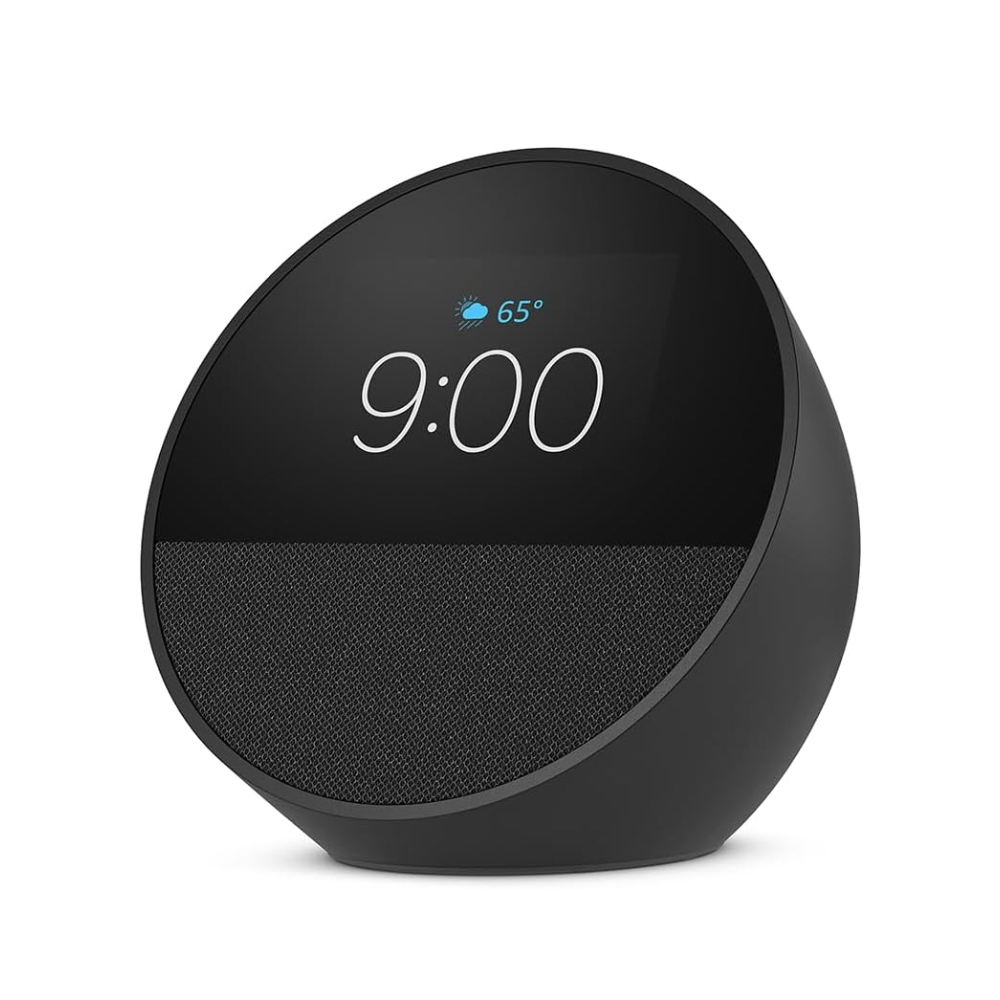
The revamped Amazon Echo Spot sits between the Echo Dot smart speaker and the Echo Show 5 smart display. It's a good middle ground for those who want a smart speaker with visual notifications for their bedside. You can see the time, weather, album artwork, and incoming calls but you won't be able to take video calls or watch shows on its display.
For
- Customizable and vibrant display
- Stylish, compact design
- Immersive sound
Against
- Lacks home automation temperature sensors found on cheaper Echo Dot
- Can’t take video calls or watch content
Think of the new Amazon Echo Spot as a cross between an Echo Dot and Echo Show smart display. It primarily focuses on excellent sound but it comes with a tiny LCD touchscreen to show you the essentials. This displays basic information like the time, weather, album art covers, and smart home control widgets with large colorful icons.
At just $80, the Echo Spot is cheaper than the best smart displays we’ve tested but lacks a camera and core functionality like watching shows, making video calls, or viewing security camera feeds. On the other hand, it offers visual info that the best smart speakers lack. In fact the closest model it competes with is its little brother, the Echo Dot with Clock which uses LEDs to show pixelated text and icons through the front mesh of the smart speaker.
Both the Echo Dot and Echo Spot are great additions to your living space because they get loud, are affordable, and offer the same Alexa smart assistant experience. Which Alexa smart speaker you should buy comes down to your style preferences and the smart home features you need. Read on to see which one’s right for your smart home setup.
Echo Spot vs. Echo Dot: Pricing
The Echo Spot smart speaker features a colorful touchscreen display and comes in a glossy Black, Glacier White, or Midnight Teal finish for $79. That's $20 more than the $59 Echo Dot with Clock, which shows basic text information like the time and song titles using LED lights.
However, at the time of this writing, the Echo Spot was priced at just $44; the Echo Dot with Clock wasn't available at Amazon, but you could get it from Best Buy for $59.
Winner: Echo Dot with Clock
Echo Spot vs. Echo Dot: Design
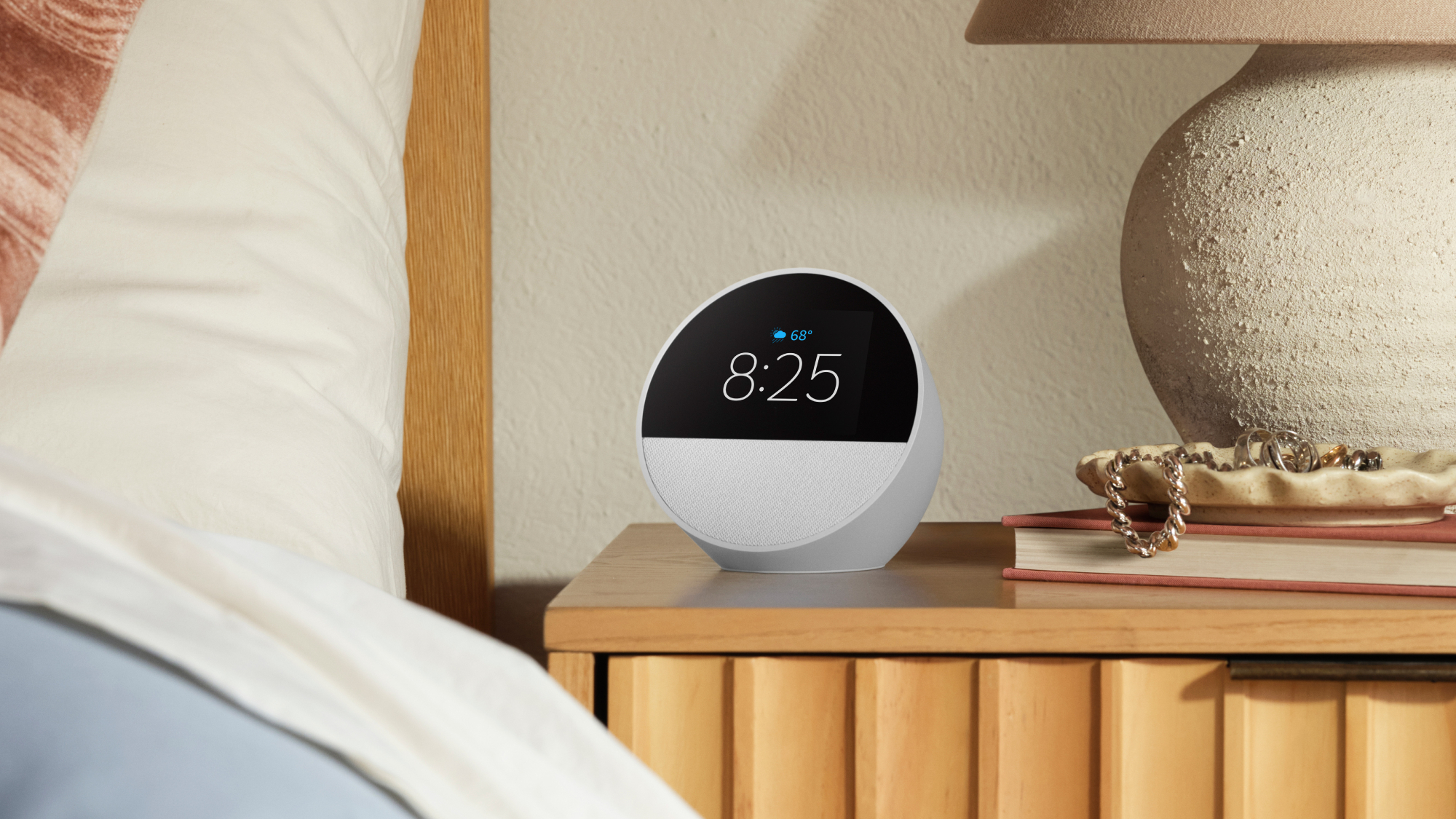
Between its more vibrant and customizable screen themes to its gorgeous flat-fronted body, the Echo Spot is a sexy piece of hardware. At 4.5 inches, it's compact enough to fit into any room but it looks especially great bed or desk side. You can use its color touchscreen to control smart home devices, view the weather, or look at album artwork as the music plays. All of its icons are unique and pop from the screen.
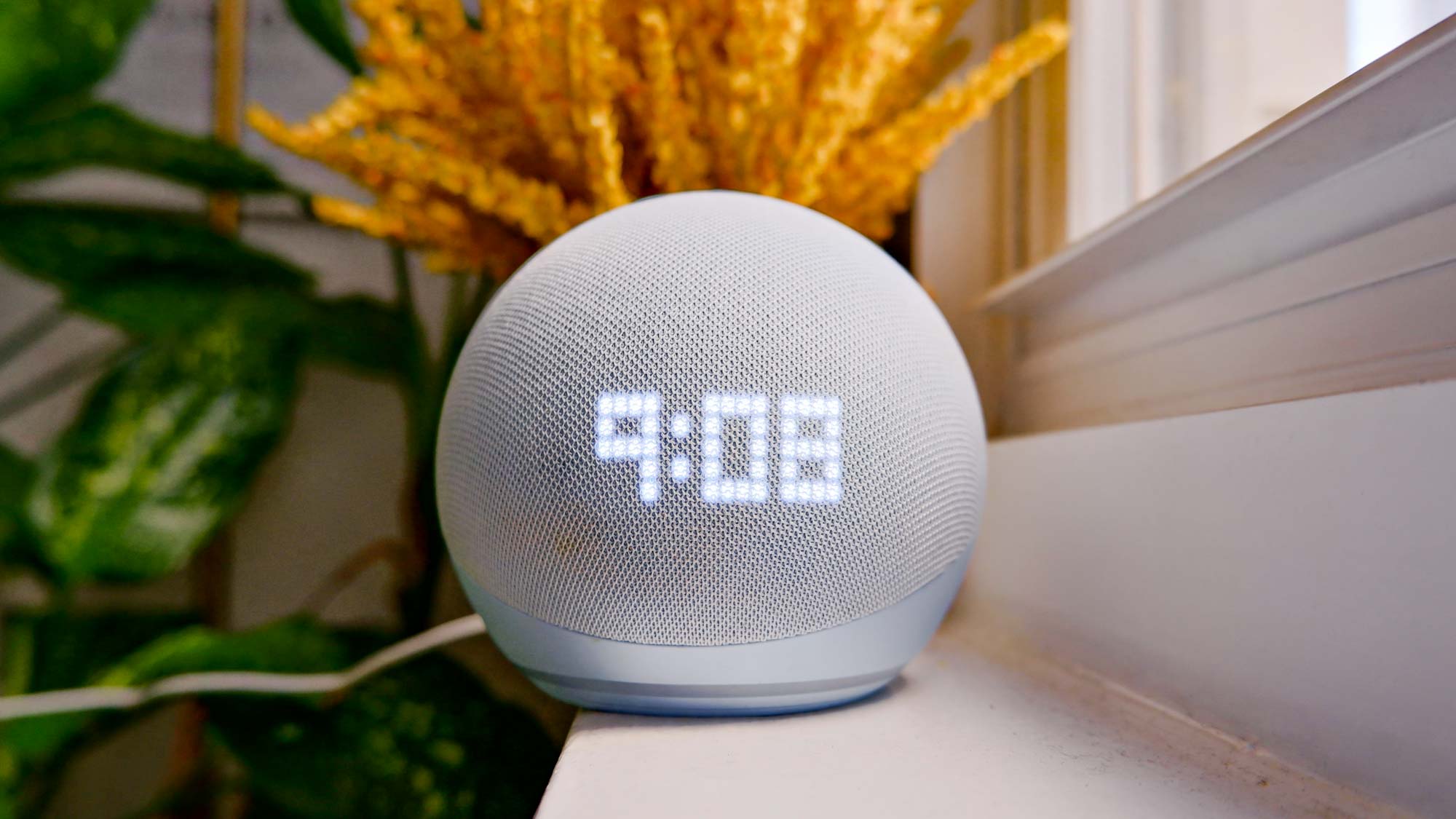
The smaller and rounder Echo Dot (3.9 x 3.5 inches) doesn't look as sleek since it takes a utilitarian approach to maximizing audio quality. Its fabric exterior and pixelated LED lights look a generation behind the Spot. If aesthetics matter to you, then it's important to keep in mind that you can’t customize the Dot's light color like you can on the Echo Spot, and it comes in more basic finishes to boot.
Winner: Echo Spot
Echo Spot vs. Echo Dot: Sound performance
The Spot’s flat front and sloped back forces audio directly from the front of the speaker. It still creates a rich enveloping sound as long as it's angled towards you. This directional audio doesn't provide as wide of a soundstage as the rounded Echo Dot, which gives all the layers a bit more room to breathe and travel around the room.
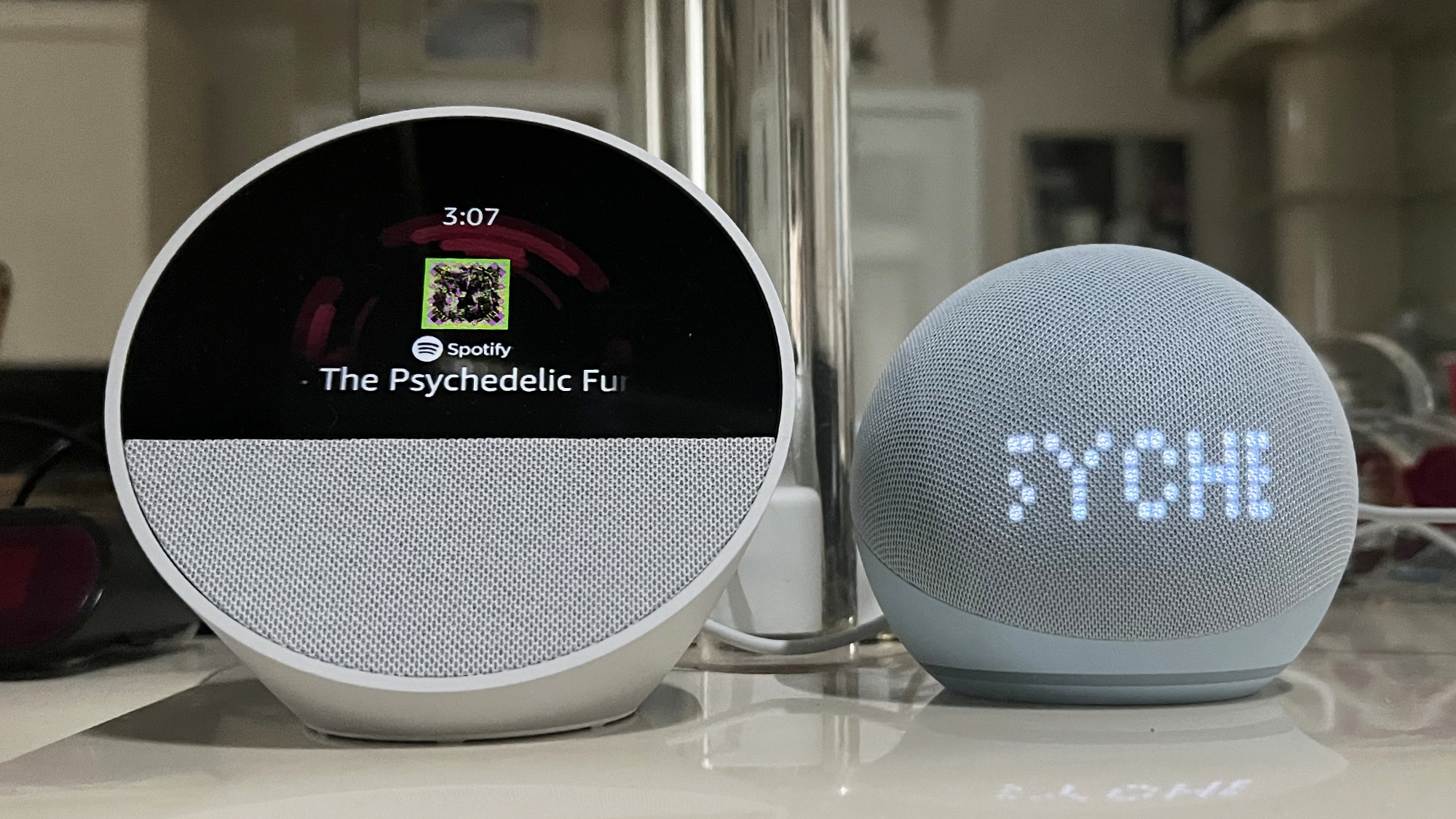
The Echo Dot gets louder and fills the room to provide a surround sound experience no matter where you are on the side of the speaker or how far away you are from it. The Dot lets vocals and bass breathe more for a richer overall sound. And while neither speaker is great on bass, the Dot has a noticeable thump that the Spot lacks.
Winner: Echo Dot
Echo Spot vs. Echo Dot: Smart home management
The Spot’s sharp microphones and bloat-free touchscreen makes for an excellent smart home command center. You can use either voice commands or touch to control widgets for lights, adjust the temperature on your smart thermostat, or lock your door with a tap. Even something as little as answering a call is more convenient with a press rather than having to tell Alexa to answer the call.
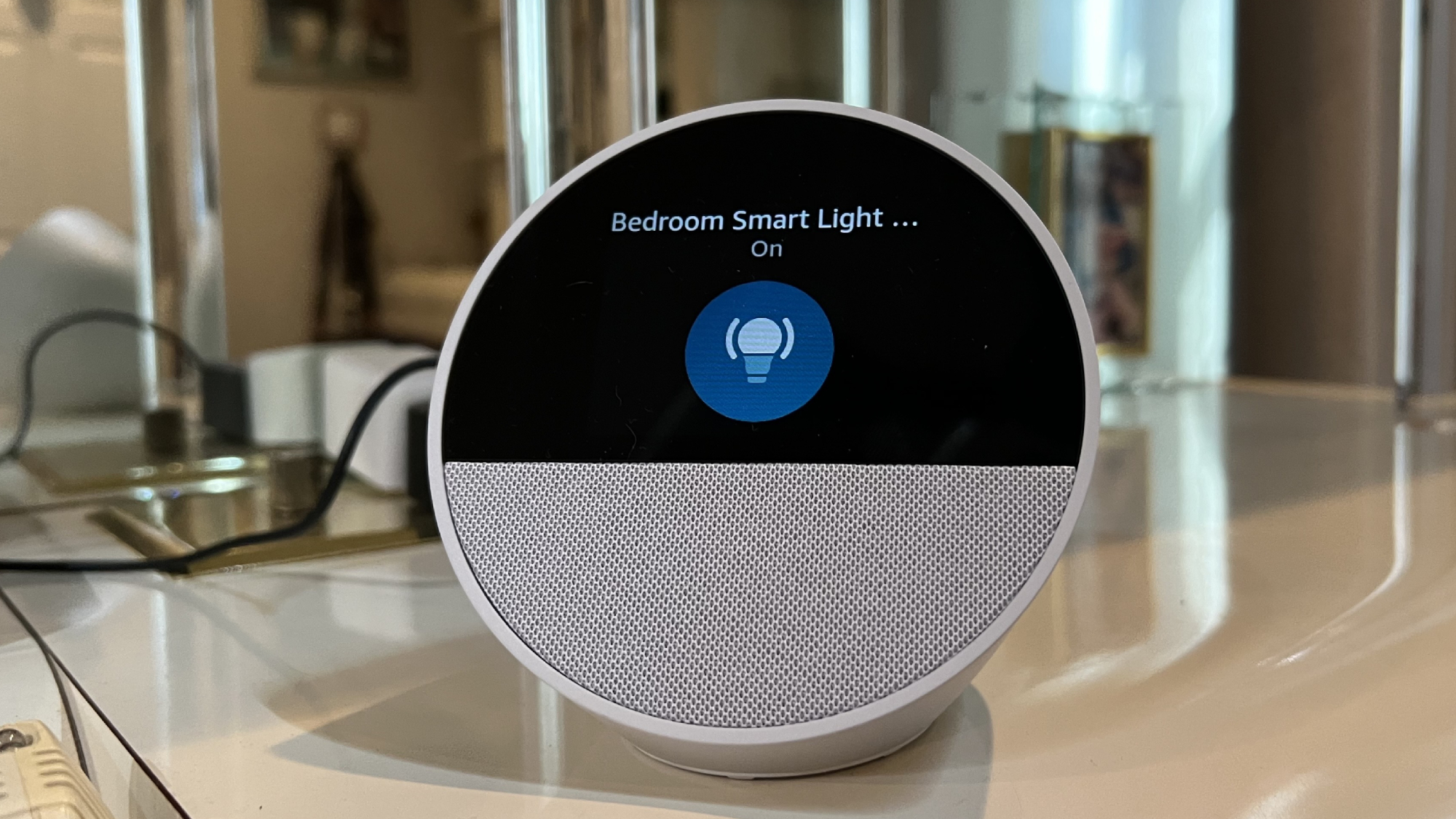
The audio-only Dot requires you to speak your commands rather than tap a button. Meanwhile, you have to listen intently to your weather forecast for the day since you won't see it sprawl out across a screen. I prefer the Spot because it can show me if a light is on or if your door is locked without having to listen out for it.
Winner: Echo Spot
Echo Spot vs. Echo Dot: Features
| Row 0 - Cell 0 | Echo Dot | Echo Spot |
| Motion Detection | Yes | Yes |
| Temperature Sensor | Yes | No |
| Eero Mesh Wi-Fi Node | Yes | No |
| Screen | No | Yes |
| Advanced Sound Detection | Yes | Yes |
The Echo Dot crams a bunch of useful smart home features into an affordable package. The Spot is newer but its functionality is a bit more basic since it lacks some built-in sensors to trigger specific automations and can't act as a mesh Wi-Fi node for an Eero system.
Motion Detection
Both smart speakers can recognize motion and room occupancy. This can help you create routines to adjust the temperature or turn on lights when you enter or exit a room. This cuts down on energy waste to help you save money.
Temperature Sensor
The Spot lacks a temperature sensor. That's a shame because the cheaper Echo Dot has one that can show you the current temperature of the room it's placed in. Even better, it can be used as a trigger for Alexa smart home routines such as kicking on air conditioning or heating if your room falls below or exceeds a certain temperature.
Eero Mesh Wi-Fi node
Another handy feature the Spot is missing. The Echo Dot can serve as a beacon to extend your Eero Wi-Fi network throughout your home.
Screen
You can view album artwork, weather animations, and the time on an always-on screen with the Echo Spot. While the Echo Dot has LED lights that can show pixelated text like time and song titles this isn't as attractive or informative. Plus you can even touch the screen to control alarms, smart home devices, or pop open notifications.
Advanced Sound Detection
Both smart speakers can detect sounds like appliance beeps or glass breaking to send a push notification to your phone. You can even use these sounds as a trigger to kick off a routine like flashing lights around the house when a laundry load is finished.
Winner: Echo Dot
Echo Spot vs. Echo Dot: Overall Winner
| Row 0 - Cell 0 | Echo Dot | Echo Spot |
| Price | X | Row 1 - Cell 2 |
| Design | Row 2 - Cell 1 | X |
| Sound | X | Row 3 - Cell 2 |
| Smart Home Management | Row 4 - Cell 1 | X |
| Features | X | Row 5 - Cell 2 |
| Total | 3 | 2 |
While the Echo Spot is newer and sports a nifty touchscreen, the Dot's advanced sensors and features still give it an edge for those who want to integrate it into their smart home. The ability to monitor a specific room's temperature, extend your Wi-Fi range, and experience a wide soundstage from anywhere in a room is better for most people. On top of that, it's more affordable.
With that said, the Echo Spot offers more personalization with the option to pick the colors and clock face. Should you want touch controls for ease-of-use or simply not wanting to wake up a partner while you sleep, this is the better option.
You can’t go wrong with either device but the Dot fits into more settings with its versatility and skill set. Especially so if you're like me and pair it with a smart speaker battery base to cut the cord and take it everywhere around the house with you.
More from Tom's Guide
Sign up to get the BEST of Tom's Guide direct to your inbox.
Get instant access to breaking news, the hottest reviews, great deals and helpful tips.

Hunter Fenollol is a Senior Editor for Tom’s Guide. He specializes in smart home gadgets and appliances. Prior to joining the team, Hunter reviewed computers, wearables, and mixed reality gear for publications that include CNN Underscored, Popular Mechanics, and Laptop Magazine. When he’s not testing out the latest cooking gadgets, you can likely find him playing a round of golf or out with friends feeding his paycheck to a QuickHit slot machine. Hunter started his career as an intern at Tom’s Guide back in 2019 while in college. He graduated from Long Island University Post with a degree in Communications and minor in Advertising. He has been vlogging ever since the iPhone 4 took front-facing cameras mainstream.
